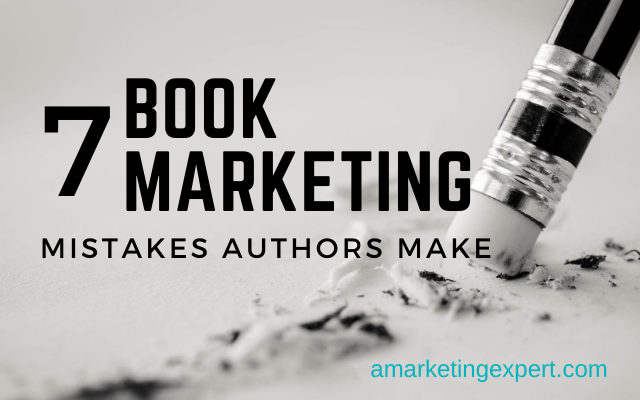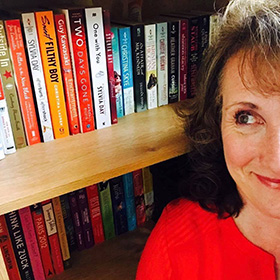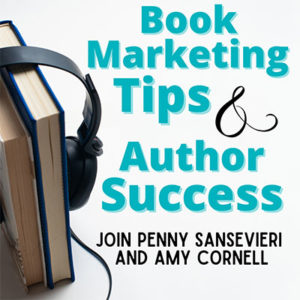You might think this article is going to solely focus on book marketing mistakes, but more specifically I’m going to dig into author branding – because the wrong branding will get you in front of the wrong readers – and it’s really hard to recover once you go down the wrong path.
Because if that happens, guess what? You won’t sell any books.
When you’re in a grocery store, or any shop that offers a variety of different products, you’ve probably noticed that similar or related products are always grouped together.
If you enter Home Depot in need of a wrench and ask a friendly worker where they’re located, you’d be confused and probably frustrated if, after following his directions, you found yourself surrounded by paint brushes.
The same principle is true for books.
More often than not, if a book isn’t selling, it’s probably because of the author branding.
And I’m not talking about a bad cover, though there’s that – I mean putting a wrench next to paint products: it just doesn’t fit.
And if you put your wrench in the paint aisle, only a few lost souls are going to find it.
Not Connecting with the Right Audience
The majority of authors struggle to gain traction because of preventable book marketing mistakes.
And a big one is targeting the wrong reader market. You can’t please everyone, nor should you try to!
Identifying and zeroing in on the right reader market is crucial: without this focus you’ll never gain traction for your book – and all of your marketing efforts will go to waste.
And let me also say, as someone who has done marketing and publicity for 20 years, you can’t hire a marketing firm to correct this mistake.
It starts with the content of the book itself, which is why I’ve said that in order to succeed as an author, you must be relentlessly obsessed with your reader market.
So how do you know if you aren’t connected to the right audience?
Well, sometimes it’ll show up in reviews, with readers saying I expected more of this or that.
Other times it shows up in blogger requests. For example, if you think you’ve written an erotic romance, but it’s really just a sexy contemporary romance, you’ll do yourself a disservice by pitching the wrong bloggers – and sometimes they’ll tell you.
If your book is failing to gain traction, misidentifying your target audience could be the biggest book marketing mistake you’re making.
If you suspect this might be the case, hiring an editor or publishing professional to give you an assessment of your book can help you to refocus your efforts on the correct market genre.
Not Investing Smartly in Your Success
This isn’t a pitch to hire a book marketing services company, but rather encouragement to invest in your success in smart ways.
There are no shortcuts up the bestseller list!
I realize there are a lot of free tools out there to help with website design, editing, book cover design, etc. But unless you’re an expert in all of those areas, I wouldn’t recommend venturing into those territories.
This doesn’t mean that you have to spend $5000 on a new website – you can certainly do websites for less than that – but you should invest in the things that will help drive book sales, like a good cover and a good content and copy edit.
All of these elements will become a part of your author brand.
In fact, everything is your brand, whether you want it to be or not.
The good news is, you can always evolve your brand!
If you launched a book and it could use a cover revamp, that’s pretty easy to do. If the editing wasn’t up to par, then get it to an editor and so on. But be willing to make the investment in yourself and your work – only then will the work reward you in return.
When it comes to publishing, “Go big or go home“ doesn’t necessarily refer to the amount you invest, but rather how smart you are about your investment.
Not Realizing This Is a Business
If you read a lot of my stuff, you no doubt know that this is something I say a lot: publishing a book is a business, and as such, you should treat it like a business.
If you aren’t ready to tackle this – or you aren’t sure how to – there are a lot of people who can help you: solid, good professionals who you can consult to better understand what the business of books means for you.
For example, as a business owner, you would never think about launching a substandard product, so why are you releasing a book that hasn’t been thoroughly vetted? Or a book that doesn’t have a market (which we’ll get into in a minute)?
Authors (even first-time authors) who treat publishing a book like a business have a better chance at success; this doesn’t mean that their books will be huge hits right out of the gate, but treating your book like a business is a necessary building block of successful publishing.
Not Using Messaging That Draws in Buyers
I get that there’s a lot to do when it comes to putting out a book.
I often hear from authors that writing was the easy part, and to some degree, it is.
But messaging – from your book description on Amazon to the words on your website – is important and all of yours should “sound” like you.
Your language choices and tone should be consistent – and this means on social media, too.
To avoid this sale-crushing book marketing mistake look at everything you’re putting out into the world about you and your book and do a self-check to make sure it is thoughtful and consistent with your brand.
Details really do matter.
The small things are what readers notice – even down to the spacing on your Amazon book page. And it’s a real thing because if your book page has typos in it – even if your book is perfectly edited – it gives the reader a sloppy impression of your efforts and may lead your potential reader to conclude that your book may be sloppy, too.
Not Understanding Your Reader Market
Another super common book marketing mistake I see authors face is the result of having limited or no understanding of their reader market.
And not understanding your reader market can manifest itself in a lot of ways.
Having a book that doesn’t quite “fit” in one particular genre will be, more often than not, a challenge.
Genre-straddling is something I see often, and trust me when I say, it never works.
You need one main genre. Yes, you can have sub-genres. But your book should belong in one main genre.
There are certain elements that readers who read that genre expect (fiction authors refer to these as tropes). By understanding your reader market, and by being a fan of the genre you’re writing in, you’ll know the elements that need to be in there – and then include them to make happy and satisfied readers!
If you’ve already headed down the wrong path – there’s a solution.
In some cases, just moving your book to the correct genre is all you need to do.
In other cases, it requires a bit more of a change in the “look” of the book (book cover) or a more thorough edit or rewrite.
Putting time and effort into making these changes will not be wasted, and in the process of doing so, you’ll also clarify your brand. Win-win.
Not Being Wildly Obsessed with Your Reader
We spend a lot of time obsessed with the latest, greatest thing – like Amazon ads (which I admittedly love) or Instagram stories, or whatever else pops up on our radar screen.
But few authors actually spend time cultivating their reader relationships, and that’s another one of the hugely avoidable book marketing mistakes.
Your author-reader relationship will benefit you in multiple ways; nourishing it is absolutely worth the (relatively small) time investment it requires.
For example, do you have a mailing list? When readers write to you, do you write them back, thank them for their note, and invite them onto your mailing list? Is that the last interaction you have with your readers? If so, there’s still a lot more you can do.
Engaging with readers, inviting them into your writing world, communicating with them and building relationships – this combination of actions is one of the best uses of your valuable marketing time.
We’re all a fan of something, right?
How would you feel if an author you adore reached out to you to thank you for reading their book? Pretty special right?
Now it’s time to do the same thing for your readers!
And once you’ve done that, to find creative ways to include them in your writing world.
Not Making Sure You Are Different
Sometimes it feels like we all just want to blend in, right?
Modeling big, successful authors in your own work is great – but how are you different?
If you’re just another James Patterson why would a reader take a chance on you, rather than go with what they know?
Sometimes figuring out how your work is different takes time.
And sometimes the difference is more in author persona, how you show up in the author-world, than work.
But cultivate and amplify what distinguishes you from the crowd. Our minds pick up differences; we remember and hold onto them.
If you look like any other author out there in your genre, readers will gravitate to whoever is at the top of that Amazon recommendations list.
Different may also be in how your books deliver on their promise.
If you’ve written non-fiction, you might have a freebie in each book as a ‘thank you’ to your readers. That makes you different.
If you’ve written fiction, there are loads of ways to differentiate yourself. For example, you could have a lead character obsessed with making fun cocktails for her friends and then guess what? This “fun cocktail” angle could be a cool thing to do on your blog, too.
Each element that makes you or your books unique is an important factor in distinguishing yourself from the pack – and also great for branding you in a way that makes you unforgettable.
Book marketing doesn’t have to be hard – and it doesn’t have to cost a fortune – but it should be thoughtful and reader-focused. It should also carry with it that “feel” of who you are and your imprint, as it were, on your books.
No amount of money you invest will matter if you don’t have your publishing ducks in a happily quacking row – or your paintbrush and wrench in the right aisles!
Resources and Free Downloads
Are Blog Tours One of the Best Book Marketing Strategies?
Exciting Updates for How to Sell Self-Published Books with Amazon
The Best Book Marketing Tips for Getting Discovered and Making the Sale






0 Comments